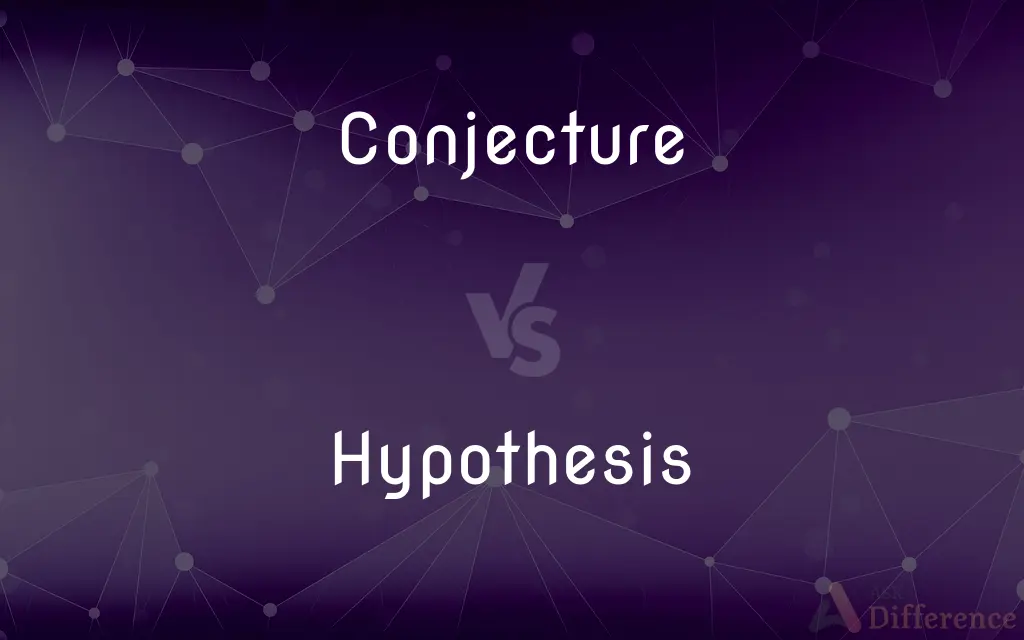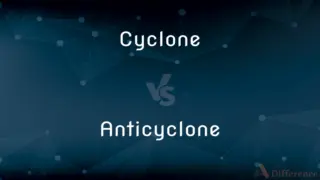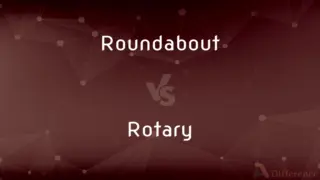Conjecture vs. Hypothesis — What's the Difference?
By Tayyaba Rehman — Updated on September 14, 2023
Conjecture is an opinion formed without concrete evidence, while a hypothesis is a testable proposition based on limited evidence.

Difference Between Conjecture and Hypothesis
Table of Contents
ADVERTISEMENT
Key Differences
Conjecture, in its essence, is an educated guess made without concrete or adequate evidence. It's often used in casual or non-scientific contexts, based on incomplete information. Hypothesis, on the other hand, stands as a foundational concept in the scientific method, a proposed explanation made on the basis of limited evidence, awaiting further investigation.
A conjecture might arise from a mere observation or initial understanding of a situation. Such observations aren't always rooted in deep analysis, and while they can sometimes hit the mark, they can also be far from reality. Hypothesis, conversely, is typically rooted in some preliminary data or logic. Before a hypothesis is accepted, it must undergo rigorous testing and empirical scrutiny.
When thinking of conjecture, one might visualize an individual speculating about everyday matters or historical events without having all the facts in hand. Hypothesis, though, paints a picture of scientists forming a preliminary idea about a phenomenon, then devising experiments to validate or refute it.
To summarize, while both conjecture and hypothesis deal with propositions made in the face of incomplete evidence, conjecture is often speculative and lacks rigorous empirical backup, whereas a hypothesis acts as a starting point for scientific inquiry and demands testing.
Comparison Chart
Definition
An opinion or conclusion based on incomplete information.
A testable proposition in science based on limited evidence.
ADVERTISEMENT
Basis
Speculation without adequate evidence.
Preliminary data or logical reasoning.
Testing
Not necessarily subjected to rigorous testing.
Requires testing for validation.
Use
Common in casual discussions or non-scientific contexts.
Fundamental in the scientific method.
Certainty
Can be far from reality or accurate.
Seeks to be closer to reality through validation.
Compare with Definitions
Conjecture
An opinion formed without thorough investigation.
His claim about the ancient city was mere conjecture.
Hypothesis
A suggested solution for an unexplained occurrence.
His hypothesis was that humidity affected the instrument's readings.
Conjecture
An idea or statement that suggests something without providing conclusive evidence.
The reason for the painting's odd color remains a subject of conjecture.
Hypothesis
A testable proposition in scientific research.
Her hypothesis was that the drug would slow down disease progression.
Conjecture
An inference drawn from uncertain or incomplete information.
Her assumptions were based on conjecture rather than fact.
Hypothesis
An assumption made for the sake of argument or investigation.
If we operate under the hypothesis that he's right, we need more staff.
Conjecture
A theory or guess lacking firm evidence.
Without more data, we can only make conjectures about the market's future.
Hypothesis
An idea or statement that is not proven but leads to further study or discussion.
The scientist's hypothesis needed more experimental evidence.
Conjecture
In mathematics, a conjecture is a conclusion or a proposition which is suspected to be true due to preliminary supporting evidence, but for which no proof or disproof has yet been found. Some conjectures, such as the Riemann hypothesis (still a conjecture) or Fermat's Last Theorem (a conjecture until proven in 1995 by Andrew Wiles), have shaped much of mathematical history as new areas of mathematics are developed in order to prove them.
Hypothesis
A tentative explanation for an observation.
Her hypothesis about the cause of the fire was proven wrong.
Conjecture
An opinion or conclusion formed on the basis of incomplete information
Conjectures about the newcomer were many and varied
A matter for conjecture
Hypothesis
A hypothesis (plural hypotheses) is a proposed explanation for a phenomenon. For a hypothesis to be a scientific hypothesis, the scientific method requires that one can test it.
Conjecture
Form an opinion or supposition about (something) on the basis of incomplete information
Many conjectured that the jury could not agree
Hypothesis
A tentative explanation for an observation, phenomenon, or scientific problem that can be tested by further investigation.
Conjecture
Opinion or judgment based on inconclusive or incomplete evidence; guesswork.
Hypothesis
Something taken to be true for the purpose of argument or investigation; an assumption.
Conjecture
An opinion or conclusion based on guesswork
The commentators made various conjectures about the outcome of the next election.
Hypothesis
The antecedent of a conditional statement.
Conjecture
To judge or conclude by conjecture; guess
"From the comparative silence below ... I conjectured that Mr Rochester was now at liberty" (Charlotte Brontë).
Hypothesis
(sciences) Used loosely, a tentative conjecture explaining an observation, phenomenon or scientific problem that can be tested by further observation, investigation and/or experimentation. As a scientific term of art, see the attached quotation. Compare to theory, and quotation given there.
Conjecture
To make a conjecture.
Hypothesis
(general) An assumption taken to be true for the purpose of argument or investigation.
Conjecture
(formal) A statement or an idea which is unproven, but is thought to be true; a guess.
I explained it, but it is pure conjecture whether he understood, or not.
Hypothesis
(grammar) The antecedent of a conditional statement.
Conjecture
(formal) A supposition based upon incomplete evidence; a hypothesis.
The physicist used his conjecture about subatomic particles to design an experiment.
Hypothesis
A supposition; a proposition or principle which is supposed or taken for granted, in order to draw a conclusion or inference for proof of the point in question; something not proved, but assumed for the purpose of argument, or to account for a fact or an occurrence; as, the hypothesis that head winds detain an overdue steamer.
An hypothesis being a mere supposition, there are no other limits to hypotheses than those of the human imagination.
Conjecture
A statement likely to be true based on available evidence, but which has not been formally proven.
Hypothesis
A tentative theory or supposition provisionally adopted to explain certain facts, and to guide in the investigation of others; hence, frequently called a working hypothesis.
Conjecture
(obsolete) Interpretation of signs and omens.
Hypothesis
A proposal intended to explain certain facts or observations
Conjecture
To guess; to venture an unproven idea.
I do not know if it is true; I am simply conjecturing here.
Hypothesis
A tentative theory about the natural world; a concept that is not yet verified but that if true would explain certain facts or phenomena;
A scientific hypothesis that survives experimental testing becomes a scientific theory
He proposed a fresh theory of alkalis that later was accepted in chemical practices
Conjecture
(transitive) To infer on slight evidence; to guess at.
Hypothesis
A message expressing an opinion based on incomplete evidence
Conjecture
An opinion, or judgment, formed on defective or presumptive evidence; probable inference; surmise; guess; suspicion.
He [Herodotus] would thus have corrected his first loose conjecture by a real study of nature.
Conjectures, fancies, built on nothing firm.
Conjecture
To arrive at by conjecture; to infer on slight evidence; to surmise; to guess; to form, at random, opinions concerning.
Human reason can then, at the best, but conjecture what will be.
Conjecture
To make conjectures; to surmise; to guess; to infer; to form an opinion; to imagine.
Conjecture
A hypothesis that has been formed by speculating or conjecturing (usually with little hard evidence);
Speculations about the outcome of the election
He dismissed it as mere conjecture
Conjecture
A message expressing an opinion based on incomplete evidence
Conjecture
Reasoning that involves the formation of conclusions from incomplete evidence
Conjecture
To believe especially on uncertain or tentative grounds;
Scientists supposed that large dinosaurs lived in swamps
Conjecture
A speculative idea about a subject.
Many have conjectures about the existence of extraterrestrial life.
Common Curiosities
Is every hypothesis tested?
Ideally, every scientific hypothesis should be testable, but not all are immediately or feasibly tested.
Is a conjecture the same as a theory?
No, a conjecture is an unproven idea or opinion, while a theory is a well-substantiated explanation based on evidence.
Can a conjecture be used in scientific discussion?
While conjectures can spark discussions or ideas, they aren't considered reliable scientific conclusions without evidence.
Can a conjecture be proven true?
While a conjecture can be supported by evidence, it's not "proven" in the same rigorous manner as a scientific hypothesis.
What happens if a hypothesis is proven wrong?
If a hypothesis is refuted by data, it's either discarded or modified and retested.
Can a hypothesis turn into a theory?
Yes, if a hypothesis is repeatedly tested and consistently supported by evidence, it can evolve into a theory.
Can conjectures be useful?
Yes, conjectures can inspire further research, investigations, or discussions.
Can a hypothesis be based on a conjecture?
A hypothesis might originate from a conjecture but would need refinement and empirical grounding to be scientifically valid.
Why is testing important for a hypothesis?
Testing validates or refutes a hypothesis, helping derive accurate scientific conclusions.
How can one differentiate between conjecture and hypothesis in a discussion?
Conjecture typically lacks solid evidence, while a hypothesis is a more structured proposition awaiting or undergoing testing.
Do all scientific studies begin with a hypothesis?
Not necessarily. Some studies are exploratory and might not start with a predefined hypothesis.
Can a proven hypothesis ever be proven wrong later on?
Yes, as new evidence or methods emerge, even well-accepted hypotheses can be refuted.
Can one hypothesis lead to another?
Absolutely. Testing one hypothesis can generate new questions and lead to the formation of subsequent hypotheses.
Is every conjecture worth investigating?
Not necessarily. Some conjectures might lack feasibility or relevance for deeper investigation.
Are conjectures more common in certain fields?
Conjectures may be more prevalent in fields where empirical testing is challenging, like history or some social sciences.
Share Your Discovery

Previous Comparison
Cyclone vs. Anticyclone
Next Comparison
Roundabout vs. RotaryAuthor Spotlight
Written by
Tayyaba RehmanTayyaba Rehman is a distinguished writer, currently serving as a primary contributor to askdifference.com. As a researcher in semantics and etymology, Tayyaba's passion for the complexity of languages and their distinctions has found a perfect home on the platform. Tayyaba delves into the intricacies of language, distinguishing between commonly confused words and phrases, thereby providing clarity for readers worldwide.














































